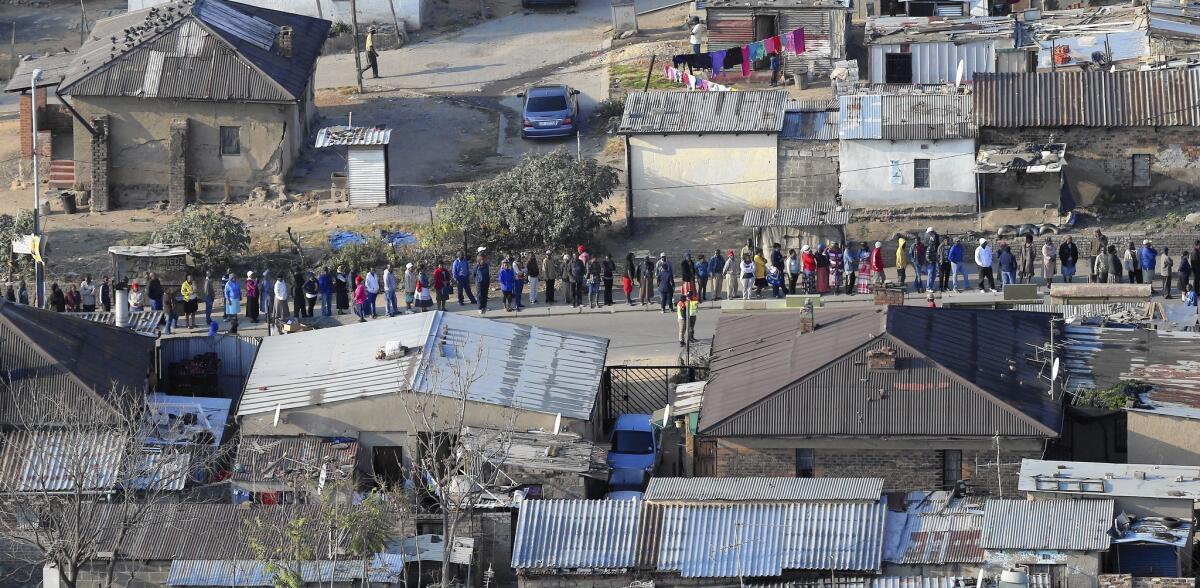South Africans vote for ANC, a party they’re fed up with

reporting from BEKKERSDAL, South Africa — In this drab township pocked by ponds of raw sewage and piles of uncollected trash, voters who lined up Wednesday to cast ballots in South Africa’s election aired similar complaints: lack of jobs, lack of sewer pipes, uncollected trash, poor government services and the seemingly endless wait for free government housing.
In a township emblematic of South African disaffection — the site of repeated riots and bombings in recent months — some people had begun waiting at dawn to vote for the party they’ve always supported, the governing African National Congress, which freed black South Africans from apartheid. Others were there to back one of many opposition parties. Still others, lolling in the sun on street corners, shrugged and said voting was pointless because nothing ever changed.
Bekkersdal, on the southwestern fringe of Johannesburg, is branded on the national consciousness because of a news photograph in March that showed police opening fire on terrified residents with rubber bullets from just two yards away. Opposition parties used the image in their campaign ads.
Hundreds of police officers and soldiers were deployed here Wednesday after voting facilities were set on fire on election eve. In recent months, the community hall and other government buildings were burned in riots; in March, door-to-door campaigners with the ANC were attacked by a mob.
Voters lined up for hours Wednesday for parliamentary and provincial elections, the fifth since full democracy arrived in 1994. Polls suggested that the ANC would command about 65% of the vote. The main opposition party, the Democratic Alliance, was expected to take about 23%.
Assuming the ANC wins a parliamentary majority, its leader, Jacob Zuma, will probably remain South Africa’s president. The post is filled by the lower house.
Chief election commissioner Pansy Tlakula said turnout was “extremely high.”
Twenty years after the country’s first democratic vote, the ANC’s nostalgia-heavy election campaign resonated with many. Thelma Maraka, 64, wearing a hot pink scarf on her head, said people in Bekkersdal were angry “because there’s no stadium, no houses, no everything. There’s no jobs.” But explaining her decision to vote once again for the ANC, she said simply, “I voted for him” — a “last chance” to vote for former President Nelson Mandela, who died in December.
“Now it’s the last chance for Madiba; I give my last chance for Madiba,” she said, using Mandela’s clan name. “I wait for five years, and if I don’t get a house and everything, I’ll leave it,” she added, referring to the ANC.
Neliswe Nkopane, 28, holding a toddler on her hip, said children in the township were getting sick because of the garbage and sewage in the streets. She was considering voting for the opposition, but said that despite her anger, it was hard to reject the ANC.
Phineas Molebatsi, 26, became an orphan at 16, leaving him to care for a 10-year-old sister and to do odd gardening jobs for about $22 a week. He has never had a regular job.
Molebatsi said he couldn’t imagine ever voting for the ANC. During the last election, he didn’t bother to go to the polls. This time he voted for the new Economic Freedom Fighters, led by expelled ANC youth leader Julius Malema, who calls for nationalizing banks and mines and seizing farms without compensation.
“We need jobs,” Molebatsi said. “I don’t like Zuma because he’s a useless father. He doesn’t have the mind to think of other people.”
Whenever protesters have spilled into the streets of Bekkersdal, he’s been among them.
Other disaffected young people, who barely remember apartheid, are alienated from politics.
Mokete Dhlamini, a 23-year-old security guard, sat in the morning sunshine on a battered car seat on a street corner, announcing that he had no intention of voting. To him, the only political party powerful enough to effect change is the ANC, yet it has chosen not to.
“I’ve never voted,” he said. “Since I’ve been living, the government never helped me with anything.”
Dhlamini complained about tjotjo — bribes paid for access to government benefits such as free houses.
“The ANC is the most powerful political party and they do nothing. If I vote DA, how can they help me?” he asked, referring to the Democratic Alliance. “They’re not powerful.”
Arriving to cast his ballot in Cape Town, Nobel laureate Desmond Tutu urged South Africans to vote.
“It is absolutely crucial,” said the Anglican archbishop emeritus. “People died for this right. People were imprisoned. People suffered, and so we mustn’t waste it. We mustn’t waste it,” he said.
Tutu recently told journalists that “with a very sore, very heavy heart” he would not vote for the ANC.
Zuma and leaders of other parties cast their votes early in the day.
The president predicted good results for the government, which won nearly two-thirds of the vote in the last election. Opposition leader Helen Zille of the Democratic Alliance said she hoped her party would increase its share of the vote in all provinces and take a major step closer to being the national government.
Malema, of the Economic Freedom Fighters, stood in line with others, waiting to cast his ballot.
“There’s no need for us to be jumping the queues. We belong to these people, and therefore if they queue, we must queue, and we must remind ourselves of past histories,” he said, adding that he was running to win. “When you get into a boxing ring, you do not fight to be No. 2. You fight to win.”
More to Read
Sign up for Essential California
The most important California stories and recommendations in your inbox every morning.
You may occasionally receive promotional content from the Los Angeles Times.










